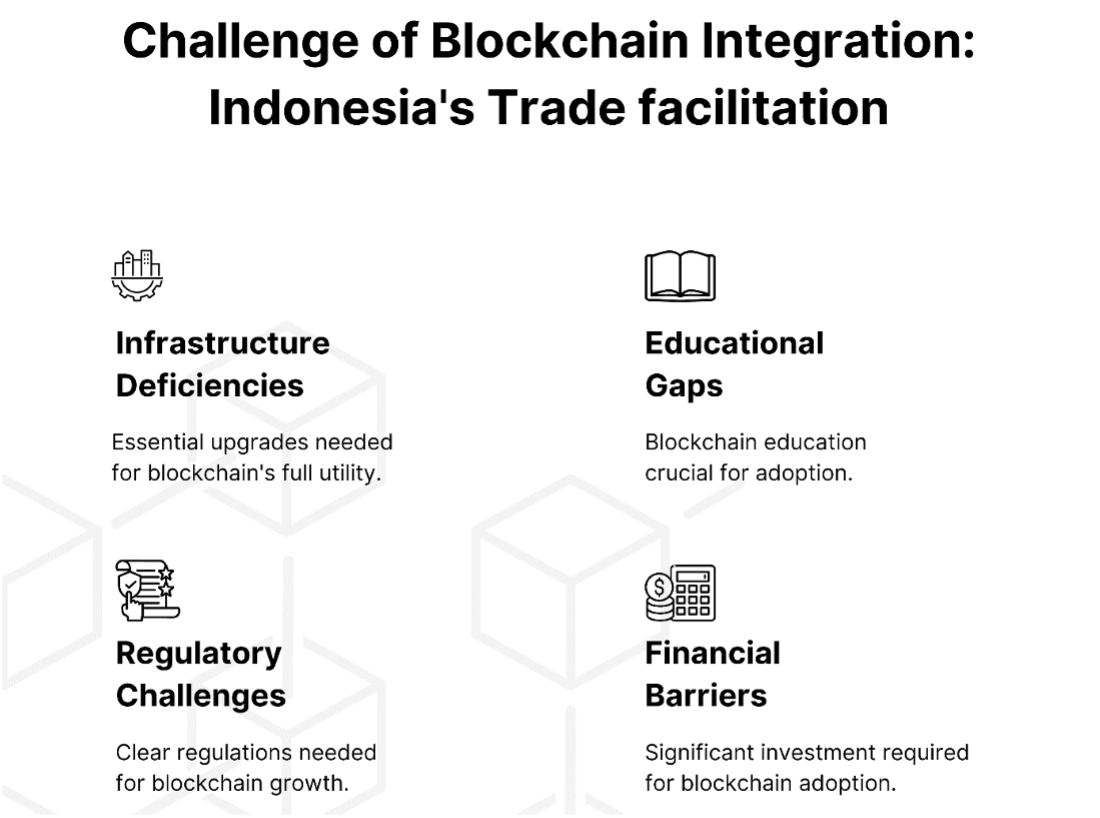The anticipated integration of blockchain technology promises to transform Indonesia's trade facilitation by bolstering transactional efficiency, enhancing transparency, and fortifying security. This technology's decentralized ledger system is poised to streamline processes, diminish fraud, and bolster transactional trust significantly.
Recognizing this transformative potential, the Indonesian government has initiated steps to embed blockchain within its trade sectors. Yet, the journey toward its widespread adoption is fraught with formidable challenges, including infrastructural inadequacies, gaps in educational understanding, regulatory ambiguities, and substantial financial demands. Addressing these obstacles with a detailed, multi-stakeholder strategy is imperative to establish Indonesia as a frontrunner in utilizing blockchain technology for trade facilitation.

Infrastructure Deficiencies
Blockchain's potential in Indonesia hinges on the establishment of a solid digital foundation. The current infrastructure, however, presents a significant bottleneck. The need for reliable and widespread internet connectivity is paramount, as blockchain systems rely on continuous, real-time data exchange. Beyond connectivity, the hardware in use requires modernization. Legacy systems lack the computational power to handle blockchain's demands, which could lead to inefficiencies and increased vulnerability to cyber threats.
Software, too, must be up-to-date and compatible with blockchain protocols to facilitate seamless integration and operation. Keefe and Jang (2023) emphasize that without addressing these infrastructural challenges, blockchain's promise of revolutionizing trade facilitation may not be realized. To this end, strategic investments and partnerships are essential to upgrade Indonesia's digital landscape, ensuring that the country's trade infrastructure is not only compatible with current blockchain technology but also adaptable to future advancements.
Educational Gaps
The effective adoption of blockchain technology in Indonesia’s trade sector is critically impeded by educational shortcomings. Business professionals and the broader community often lack a clear understanding of blockchain's operational mechanisms and its transformative implications for trade. Fitriadi et al. (2022) underscore the importance of closing this educational divide to facilitate smoother adoption and utilization of blockchain technology.
Resistance to adopting blockchain often stems from a fear of the unknown; thus, demystifying the technology through comprehensive educational programs is crucial. Initiatives such as targeted training sessions, interactive workshops, and nationwide awareness campaigns can illuminate the practical benefits of blockchain, such as enhanced security and efficiency in trade processes. By empowering stakeholders with knowledge and practical skills, Indonesia can accelerate blockchain adoption and foster a more conducive environment for digital innovation in trade facilitation.
Regulatory Challenges
Indonesia's blockchain landscape is confronted with regulatory challenges that impede its growth. The existing legal framework is yet to evolve to adequately address the complexities introduced by blockchain technology. Indrawijaya (2022) draws attention to the urgent requirement for comprehensive regulations that ensure the security, privacy, and trustworthiness of digital transactions facilitated by blockchain. The absence of a robust legal infrastructure can deter businesses from adopting this technology due to the potential for legal ramifications and the resulting operational uncertainties. There is a pressing need for the government to collaborate with legal experts and industry stakeholders to craft clear, forward-thinking policies that align with global standards and encourage innovation while protecting all parties involved in blockchain transactions. By establishing a regulatory environment that is both secure and conducive to growth, Indonesia can pave the way for blockchain's integration into its trade ecosystem, mitigating the apprehensions surrounding its adoption.
Financial Barriers
Financing the blockchain revolution in Indonesia's trade practices is a formidable challenge. The substantial costs associated with upgrading infrastructure, coupled with the investment in education and training for blockchain technology, present significant financial hurdles. The responsibility to fund these endeavors falls not only on the government but also on the private sector, which stands to gain from the improved trade efficiencies blockchain offers. Viewing these investments as strategic expenditures is crucial for stakeholders, as they are not just funding technology but also investing in the modernization of Indonesia’s trade infrastructure and the long-term growth of its economy. These financial contributions will facilitate the development of a robust platform for blockchain technology, driving innovation and competitiveness in the trade sector. A concerted effort to secure and allocate funds strategically is essential to overcome these financial barriers and ensure the successful adoption of blockchain in Indonesia.
Collaborative Approach for Success
Achieving success in blockchain adoption for trade facilitation in Indonesia requires a synergistic effort that transcends individual sectors. The government's role is pivotal in orchestrating a unified approach, fostering collaboration between industry leaders, academia, and civil society. This cooperative strategy must address the multifaceted needs of infrastructure enhancement, educational development, regulatory support, and financial investment. By consolidating these efforts, Indonesia can harness the transformative power of blockchain technology, leveraging it to streamline trade processes, and to establish a transparent and secure trade environment. This collaborative approach not only accelerates the adoption of blockchain technology but also propels Indonesia to the forefront of digital innovation in trade facilitation on a global stage.
Conclusion
The integration of blockchain technology into Indonesia's trade facilitation represents a forward-thinking move towards enhancing efficiency, transparency, and security within the sector. Despite its promising potential, the journey towards full adoption is marked by notable hurdles in infrastructure development, educational outreach, regulatory clarity, and financial commitment. These challenges necessitate a unified and strategic response, calling for the mobilization of resources and expertise across government, industry, academia, and civil society. By fostering an environment of collaboration and innovation, Indonesia has the opportunity to not only surmount these obstacles but also to pioneer a model of trade facilitation that could inspire and guide similar initiatives worldwide. This concerted effort to embrace blockchain technology underscores Indonesia's commitment to adopting cutting-edge solutions to modernize its trade systems, promising a future where trade processes are more streamlined, transparent, and secure. Success in this endeavor will not only benefit Indonesia's economy and its participants but also position the nation as a global leader in trade facilitation, setting a benchmark for excellence and innovation on the international stage.
Dimas Harris Sean Keefe

